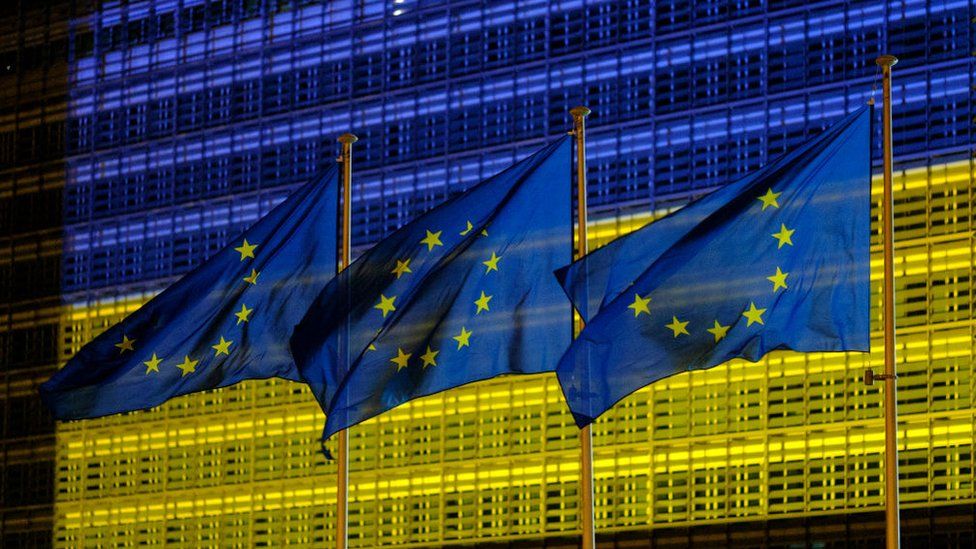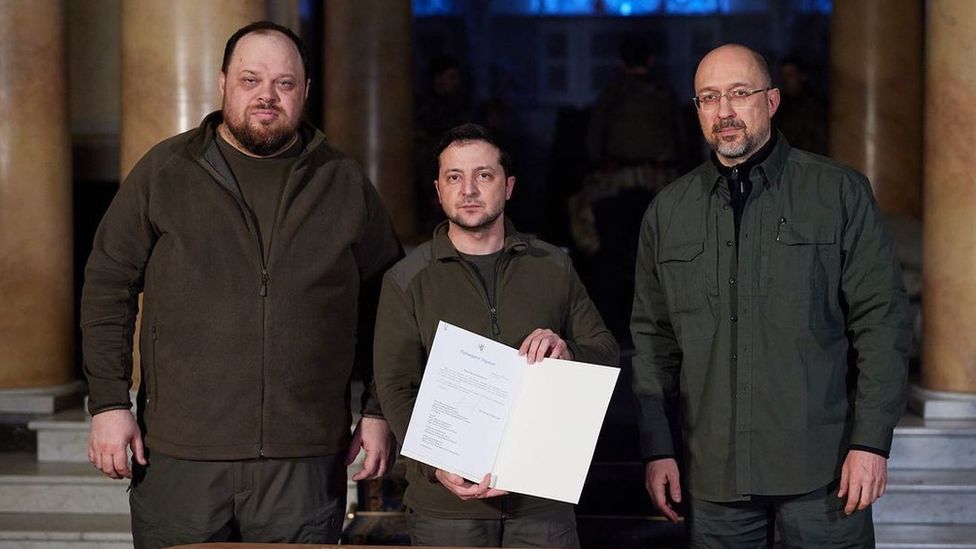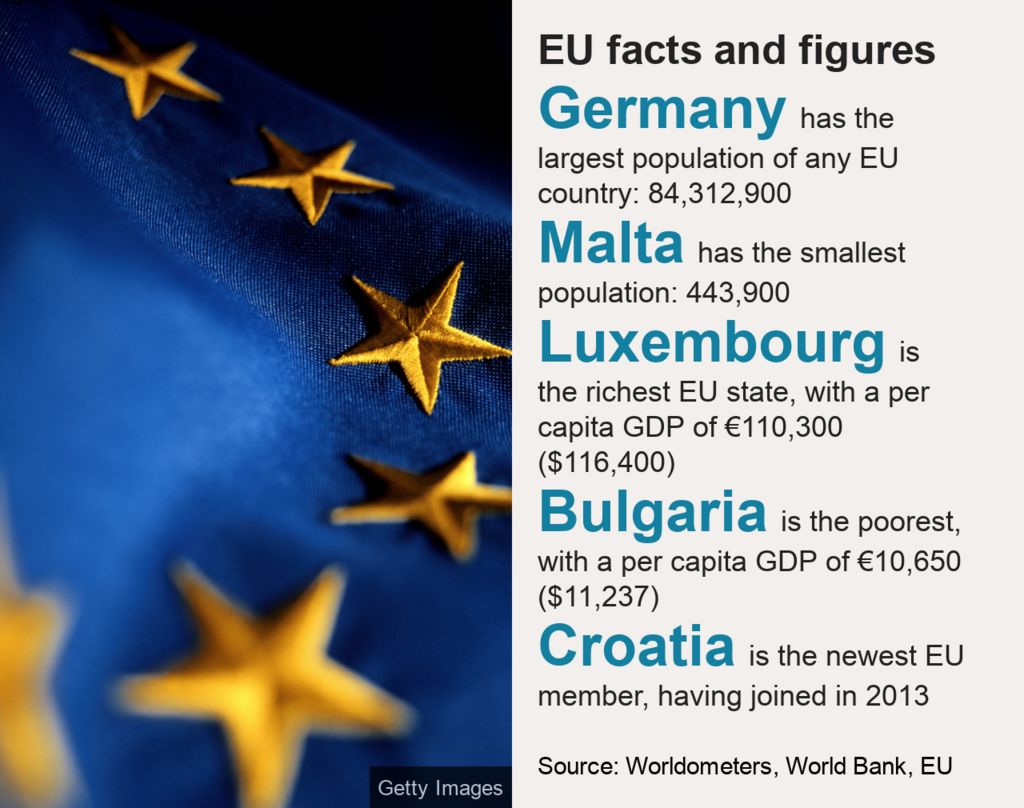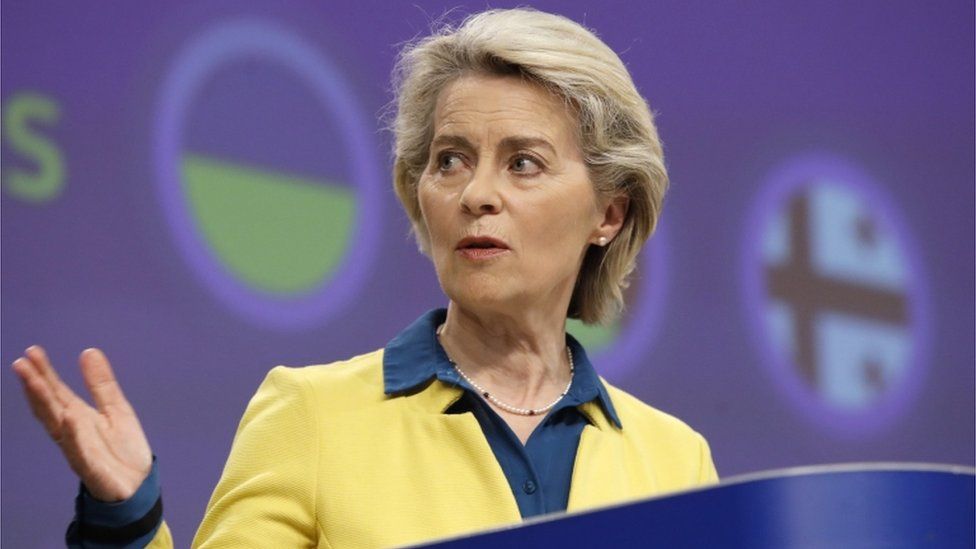 Image source, Getty Images
Image source, Getty ImagesUkraine is set to become an official candidate for European Union (EU) membership, the first step to joining the 27-country bloc.
EU leaders are expected to back the move at a summit being held on 23 and 24 June.
And the Ukrainian president has warned Russia may increase its military attacks in retaliation to the decision.
What is the EU?
The European Union is an economic and political union between 27 European countries, which was created in the aftermath of the Second World War.
Goods, services and money move freely between member states. EU citizens can live and work anywhere within the bloc.
It operates a single European currency, the euro, which is used by more than 340 million people in 19 of the EU’s 27 countries.
Common standards apply across member states in a number of areas including food safety, farming and employment rights.
Why does Ukraine want to join?
President Volodymyr Zelensky began the application for EU membership five days after Russia invaded his country in February 2022.
He asked to be able to join immediately, but the process could take years.
 Image source, Gertty Images
Image source, Gertty ImagesUkraine filed its application to join the EU in February 2022
There would be financial benefits to joining the EU. But Ukraine’s main motive is not economic, argues Dr Zach Paikin, from the Centre of European Policy Studies think tank in Brussels.
“EU membership would establish Ukraine firmly as an independent, sovereign European state,” he says. “Not merely part of the Russian world.”
How do countries join the EU?
It considers whether it has a stable, democratic government, respects human rights, and has a free market economy.
 Image source, Getty Images
Image source, Getty ImagesAll existing EU members have to agree before a new country can become a candidate.
If successful, the country has to adopt all the EU’s laws and regulations. This normally takes several years.
Finally, the country signs an accession treaty which all the other EU countries have to ratify.
How long does joining the EU take?
For recent joiners Bulgaria, Romania and Croatia, the entire process took between 10 and 12 years.
Albania, North Macedonia, Montenegro and Serbia have been official candidates for years, but their applications have stalled.
Ukraine’s neighbour, Moldova, was accepted as a candidate on the same day as Ukraine. Georgia also applied, but was told it must make further reforms.

How would Ukraine fit into the EU?
- Largest land mass of any country in the EU: 603,550 sq km (233,032 sq miles). Not counting France’s overseas departments
- Fifth-largest population: 44.13 million
- Ukraine’s annual GDP per capita is $3,724 (£3,040) – one-ninth of the EU average
- It already sells the EU 30% of all the grain it imports

What are Ukraine’s current links with the EU?
Since 2017, Ukraine has been able to trade with EU states without paying tariffs, under a so-called association agreement.
As part of its preparation to apply for membership, Ukraine has already changed many of its laws and regulations to meet EU standards.
What else would Ukraine need to do?
European Commission president Ursula von der Leyen says “good work has been done”, but that Ukraine must make further “important reforms”.
 Image source, EPA
Image source, EPAWearing Ukraine’s colours, Ms von der Leyen said she wanted the country “to live with us in the European dream”
These include strengthening the rule of law, improving human rights, reducing the power of oligarchs, and tackling corruption.
“There’s also a need for Ukraine to build a fully-fledged market economy,” says researcher Zach Paikin, “which is difficult for a post-Soviet republic.”
Another challenge will be cleaning up Ukraine’s court system, which has been widely criticised.
How has EU membership helped recent joiners?
The EU has given tens of billions of euros to both countries through European Structural and Investment Funds. These support economic development by, for example, building new roads and ports.
How has Russia reacted to the prospect of Ukraine’s EU membership?
However, his spokesperson, Dmitry Peskov, says the Kremlin will give the application “increased attention” because the EU is considering forming its own defence force.
“The military, defence and security components are being discussed,” said Mr Peskov. “We are, of course, observing it all thoroughly.”
“Obviously, we should expect greater hostile activity from Russia,” he said. “And not only against Ukraine, but also against other European countries.”







More Stories
Kerr’s skill ‘made the boys cry’
Tufnell predicts Australia win on final day of Ashes
No hope of survivors from MRH-90 helicopter crash in Australia